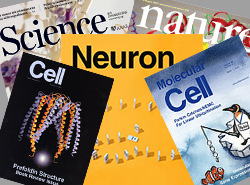Publication of IMPRS-LS student Melania Spadaro

Spadaro, M., Winklmeier, S., Beltran, E., Macrini, C., Hoftberger, R., Schuh, E., Thaler, F.S., Gerdes, L.A., Laurent, S., Gerhards, R., Brandle, S., Dornmair, K., Breithaupt, C., Krumbholz, M., Moser, M., Kirshnamoorthy, G., Kamp, F., Jenne, D., Hohlfeld, R., Kumpfel, T., Lassmann, H., Kawakami, N., and Meinl, E.
Ann Neurol., 2018, [Epub ahead of print].
doi: 10.1002/ana.25291
Pathogenicity of human antibodies against myelin oligodendrocyte glycoprotein
OBJECTIVE:
Autoantibodies against myelin oligodendrocyte glycoprotein (MOG) occur in a proportion of patients with inflammatory demyelinating diseases of the CNS. We analyzed their pathogenic activity by affinity-purifying these Abs from patients and transferring them to experimental animals.
METHODS:
Patients with Abs to MOG were identified by cell-based assay. We determined the cross-reactivity to rodent MOG and determined the recognized MOG-epitopes. We produced the correctly folded extracellular domain of MOG and affinity-purified MOG-specific Abs from the blood of patients. These purified Abs were used to stain CNS tissue and transferred in two models of experimental autoimmune encephalomyelitis. Animals were analyzed histopathologically.
RESULTS:
We identified 17 patients with MOG Abs from our outpatient clinic and selected two with a cross-reactivity to rodent MOG; both had recurrent optic neuritis. Affinity-purified Abs recognized MOG on transfected cells and stained myelin in tissue sections. The Abs from the two patients recognized different epitopes on MOG, the CC' and the FG loop. In both patients these Abs persisted during our observation period of 2-3 years. The anti-MOG Abs from both patients were pathogenic upon intrathecal injection in two different rat models. Together with cognate MOG-specific T cells, these Abs enhanced T cell infiltration; together with MBP-specific T cells, they induced demyelination associated with deposition of C9neo, resembling a multiple sclerosis type II pathology.
INTERPRETATION:
MOG-specific Abs affinity purified from patients with inflammatory demyelinating disease induce pathological changes in vivo upon co-transfer with myelin-reactive T cells, suggesting that these Abs are similarly pathogenic in patients.
